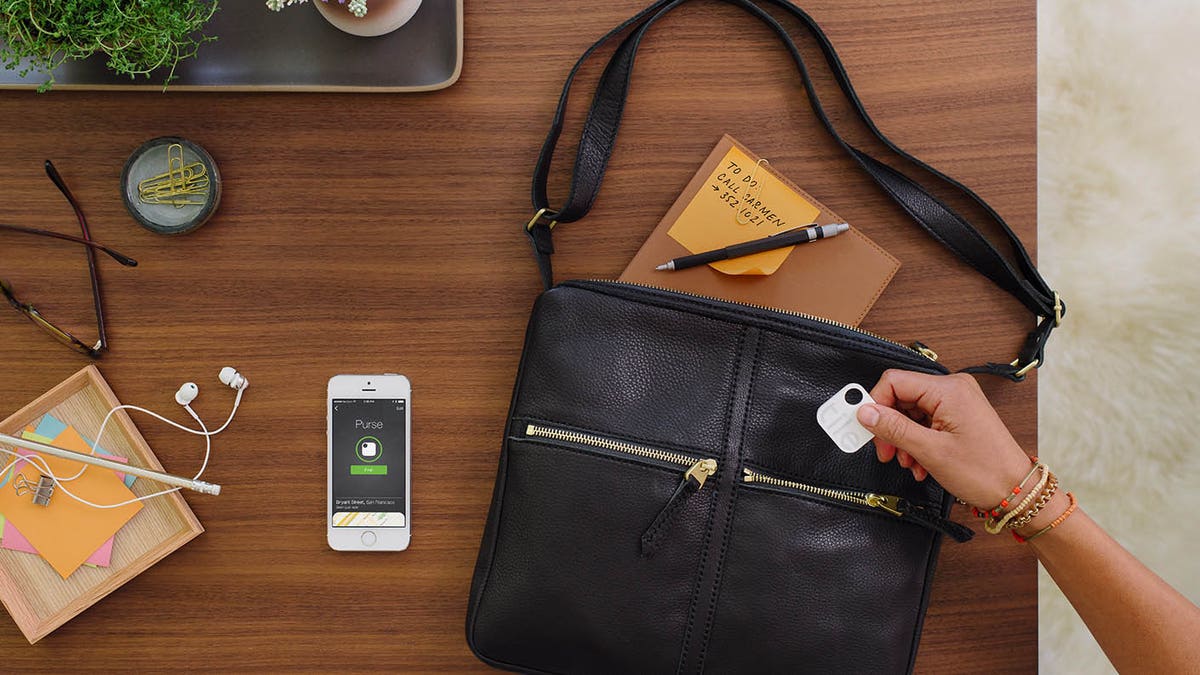
Tile tracking device. (Tile)
If you're a worrier, traveling can present its own special anxieties: Where's my phone? Where's my bag? How come my luggage isn't on the baggage carousel yet?
Some day, in the omnipresent Internet of Things fantasy future, we'll know where everything is all the time. But until that day comes there are tracking devices and services designed to calm anxious travelers.
Tile is a relative newcomer to the space, with its $25 two-tone white tracking device that's about the size of a pack of matches with a hole in the corner for hanging it off a key chain, dog collar, or piece of luggage. The device lasts for a year (you can't replace the internal battery) and the “e” in the Tile logo on it acts as a button to pair it via Bluetooth with your phone.
To use it you simply download the app (iOS or Android), pair the phone with the Tile gadget, and then stash it on or lash it to whatever device you want to keep track of. It works at distances up to 150 feet, although I found that in public areas like airports the practical range was shorter. The app can find your device, with concentric rings showing you're getting warmer or colder. You can also sound an alarm (about the decibel level of someone talking) should the item be hidden from view, such as under a seat cushion.
Related: The end of Internet anonymity
Tile can be handy in specific situations, such as when you have to shove your carry-on in an overhead bin several aisles away. However, it doesn't work if your prized possession is miles away from you and your smartphone.
To solve the latter issue, there's a crowdsourcing solution wherein other Tile users can anonymously help track your item if they happen to be near it. However, like traffic apps such as Waze, it takes many thousands of users to begin to make this work. Unfortunately, there aren't that many Tile users traveling around the world yet, so, in my international travel experience, once my luggage was more than 70 feet away, it was as good as lost until it came back within range of my phone.
The $29 TrackR Bravo offers many of the same features as Tile. It's slightly smaller and uses a replaceable CR1616 battery, a distinct advantage.
It will also alert you via a chime on your phone that you're leaving something behind. However, you can wander pretty far in a public place, say 50 feet, before you get the warning. That's good enough to prevent you from leaving an item on a plane by accident but not quick enough to prevent a thief from snatching a neglected bag from you in a public place.
The TrackR Bravo--and Tile--can be used in reverse to locate your smartphone. Say you've got a TrackR Bravo on your keychain but can't find your phone, simply press the button on the Bravo and your phone will ring (even if it's on mute). There's also a setting for linking up to your Nest thermostat so that the app can automatically switch off the warnings when Nest tells it you're at home.
Related: App to school: Top 5 free apps for students
In the final analysis, neither tracking system is something you can simply set and forget. You may feel it becomes just one more thing to you have to remember and worry about. Indeed, a friend of mine said he stopped using a competing tracking device after someone at an airport stole it off his luggage.
Nevertheless, nearly everyone ends up having a jet-lagged moment, and I had my own traveling recently. While testing the tracking devices, I managed to lose a cell phone one evening in Stockholm. Fortunately, it didn't ruin my evening, thanks to Lookout and a good samaritan.
Lookout is a free anti-theft and anti-virus app. On Android, you can find your phone by accessing your account through any Web browser, remotely sound an alarm, and receive a signal identifying the phone's last known location just before the battery runs out. (A premium version costs $30 a year for more features, including the ability to remotely wipe all the data off the phone should it be stolen). Thanks to Lookout, I knew my phone was back at the hotel. However, when I returned, the phone was not as I had assumed in my room.
Thankfully, someone had found it on a coffee table in the lobby and turned it in to the front desk. So in the end, despite all the technology, finding lost items comes down to some decidedly non-technical factors, namely, the kindness and consideration of fellow travelers.




















